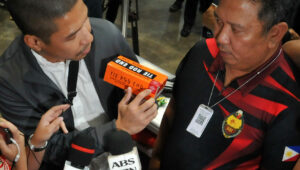Seizures of counterfeit goods hit P41 billion in 2024 led by apparel, shoes, bags
THE National Committee on Intellectual Property Rights (NCIPR) seized P40.99 billion worth of counterfeit products in 2024, the Intellectual Property Office of the Philippines (IPOPHL) said. “It is increasing year by year, and I would like to attribute it to the efforts of law enforcement agencies,” IPOPHL Deputy Director General Nathaniel S. Arevalo told reporters […]

THE National Committee on Intellectual Property Rights (NCIPR) seized P40.99 billion worth of counterfeit products in 2024, the Intellectual Property Office of the Philippines (IPOPHL) said.
“It is increasing year by year, and I would like to attribute it to the efforts of law enforcement agencies,” IPOPHL Deputy Director General Nathaniel S. Arevalo told reporters on the sidelines of the Japan External Trade Organization (JETRO) Seminar on Thursday.
“It’s an all-time high, (involving) our usual items like apparel, shoes, bags, food supplements, and toys. But most of them are apparel and shoes,” he added.
According to IPOPHL, the estimated value is 52% higher than the P26.99 billion worth of counterfeit products seized in 2023.
“Last year’s haul from the Bureau of Customs (BoC) accounted for the lion’s share, totaling P34.70 billion,” it added.
Two of the biggest operations of the BoC were a raid in Binondo which yielded P11 billion worth of counterfeit luxury goods, and an operation at a Divisoria mall, which resulted in the confiscation of counterfeits valued at P7 billion.
“BoC’s haul was followed by seizures by the National Bureau of Investigation and Philippine National Police estimated at P3.42 billion and P2.83 billion, respectively,” IPOPHL said.
“Meanwhile, the Food and Drug Administration seized P30.20 million worth of counterfeit drugs and health-related products,” it added.
Mr. Arevalo said the agency is looking to further educate the public on IP issues and will seek amendments to the Intellectual Property Code.
“(We will continue) educating the public about the dangers of counterfeiting because it is not just an issue of fake goods, but also the dangers to public safety of counterfeit health supplements, medicines, and devices,” he said.
He said the proposed IP Code amendments would give the agency “more teeth in the fight against piracy and counterfeiting.”
On Monday, the IPOPHL, together with other members of the NCIPR, attended the JETRO Seminar for law enforcement agencies.
“This event is meant to enhance the competence and skills of the law enforcement agencies as far as the identification of the fake products,” he said.
“That’s why the brand owners from Japan are here, because they are the experts,” he added. — Justine Irish D. Tabile


















